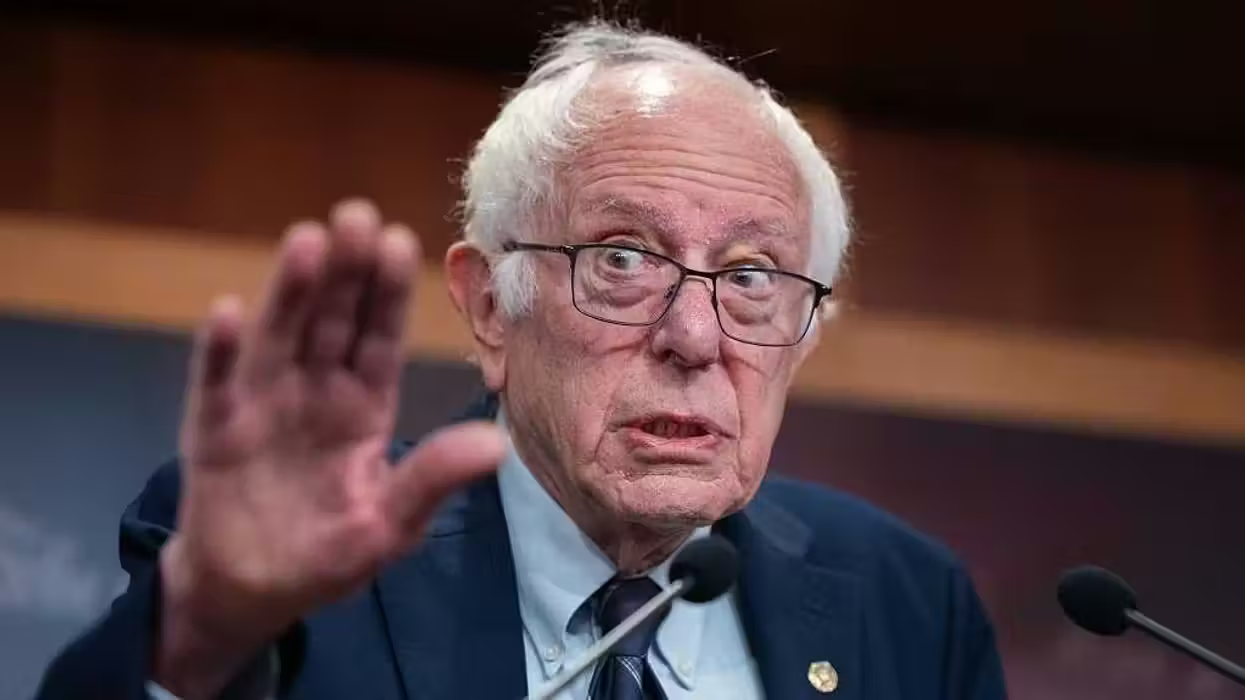
© 2025 Blaze Media LLC. All rights reserved.
"Macroeconomics, especially, is politics dressed up in algebra"
Jim Grant, prominent financial journalist, founder of the highly influential Grant’s Interest Rate Observer, ardent free-marketeer and author of numerous books, recently sat down with Steve Forbes to talk about the Fed’s persistent intervention, his forthcoming book on the little-studied great depression before the Great Depression, the Fed’s version of the "hidden ball trick" and much more.
Below are eight of the most insightful excerpts from the interview, the full video of which you can find at the bottom of the post:
 Steve Forbes interviews Jim Grant (Image Source: YouTube Screengrab)
Steve Forbes interviews Jim Grant (Image Source: YouTube Screengrab)
1. Stimulus by the bottleful has created an overmedicated economic patient
"I think, first and foremost, the patient is overmedicated – that is, the economic patient. Stimulus by the bottleful … by the prescription-full. Gradually – or, I guess not so gradually – the Federal Reserve has moved to substitute price administration for price discovery, and it seems to me that the Fed’s full-court press, to switch metaphors, of markets and pricing has induced a deep complacency with respect to financial assets and has also introduced a sharp degree of optimism or what we might call even inflation in the financial markets. I certainly can’t explain why, to date, very little inflation has been visible in the consumer realm. But you know, one would almost expect that in this day and age of miraculous digital enhancements to everything we do and the related improvements and efficiency of production, the prices would, in the absence of these monetary exertions, actually fall … dwindle a little bit. So I suppose a little bit of inflation is itself an anomaly. One ought to have seen a dividend for the working guy in the shape of everyday lower prices."
2. It’s about Fed price control

"I think what has changed is not so much the behavior of prices, but rather the attitude of our central bankers towards prices. They feel like they must control them and they must raise them up … I think what is different today is the Fed’s intrusion into the pricing of stocks. Chairman Bernanke famously, or as you might say, infamously took credit for the levitation of small cap indices a couple years ago. So the Fed has got its finger in almost every financial market pie."
[sharequote align="center"]"The Fed has got its finger in almost every financial market pie."[/sharequote]
3. We shouldn’t even talk about "the economy," it’s "the aggregation of individual effort"
Forbes: "The economy itself in the last 5 years … 1.8% [growth rate] … truly subpar. Is it gonna get better or is it just one of these walking pneumonia things that will just continue?"
Grant: "The more birthday candles I blow out, the more agnostic I become. In fact, I’ve even begun to doubt this thing – the "economy" … it seems to me it oughta to be a phrase we use in quotation marks. It is the aggregation of individual effort. It’s a fairly recent conceptual invention, this thing we call the economy. It mostly came about through the attempts to measure and mobilize business activity during the Second World War. Paul Samuelson, I guess, was the preeminent voice of war … conceiving of things in the aggregate. For most of our American financial and economic history, we didn’t even talk about the economy. It was farming … or enterprise … or textiles … or trade or commerce. When you’re president, Steve, I want us to get back to that."
4. Grant and Forbes take a jab at macroeconomics
Grant: "Macroeconomics, especially, is politics dressed up in algebra."
Forbes: “Certainly that would seem to be the history of John Maynard Keynes.”
Grant: "Yes, indeed."
[sharequote align="center"]"Macroeconomics, especially, is politics dressed up in algebra."[/sharequote]
5. Grant’s brilliant explanation of the obscure but potentially dangerous "reverse repos" the Fed is currently undertaking, and why it matters

"Football fans will recognize this as the old Statue of Liberty play … or the hidden ball trick. Here’s the way it works: The Fed, for many years, [engaged in] what they call quantitative easing, meaning the purchase of vast amounts of treasuries and mortgage-backed securities with money that didn’t exist before the Fed created it. The Fed accumulated 4 trillion or so of these securities. So the Fed has stripped Wall Street of what it calls collateral (securities). The Fed has a plan, and the plan is to invite Wall Street to borrow temporarily these securities in exchange for Wall Street’s cash. Wall Street has acquired all this cash from selling these securities and now the Fed wants Wall Street to reacquire the collateral in exchange for Wall Street’s cash. And the Fed is proposing to pay 5/100 of 1% interest to borrow this money.
It’s rather complex, except the purpose is two-fold. One is to control the short-term money market interest rate....And the second object is to sweep away redundant cash come the time when conventional inflation – that is, not inflation on Wall Street … what we call the Bull market, but inflation at the checkout counter … the bad old kind of inflation – when that inflation rears its head."
6. What is the real takeaway from the Fed’s response to the financial crisis?
"I think the takeaway is that there has been a succession of interventions since 2007 and they accumulate to immense, improbable, unimaginable amounts of digitized, immaterial money. And they also have given us immense incentives to invest and speculate in new and arguably riskier ways."
7. On the "scandalous weakness" of our banking system
 (Image Source: Getty Images)
(Image Source: Getty Images)
Forbes: "We had a severe crisis in the 70s and yet Reagan couldn’t get the restoration of a gold standard. Milton Friedman and others were adamantly opposed. We had a disaster in ‘08 and ‘09 and instead of punishing the Fed, it gets punished with more powers. So a crisis in and of itself doesn’t lead to the solution. Is it just the hard work of persuading people that there is a better way?"
Grant: "I think it is exactly that hard work which you, Steve, have taken that lead in doing. To me, it is inexplicable the hold that the current regime of money and credit has on the so-called thought leaders of finance. I guess many of them do benefit from 0% funding cost when the cost to borrow, to undertake a leverage buyout, or undergoing private transaction is 4% or so with credit risk. That state of affairs is not going to strike everyone as objectionable. People in Greenwich, Connecticut rather like it, and I think the banking community doesn’t object to it so much although the 2008 and 2009 was a crisis not even so much of money as it was of credit … the promise to pay money. And it revealed the scandalous weakness of our banking situation. My goodness, there was no depression, and yet, these institutions came to the brink, and over the brink, of failure. What an indictment of analysis, of credit, of foresight, of stewardship.
Back in the day, Steve, there was something called the double liability rule [link ours] and it meant that stockholders in a nationally chartered bank were held accountable in the event of the impairment or the insolvency of the institution in which they invested. They got a capital call from the court in the case of a crisis. And they got a capital call to the full extent of the par value of the shares they own. And it resulted in a great pile of money for the creditors … this legal requirement. It was outlawed about the time the FDIC came in. But if you think about the evolution of credit from that time to this, it has all been about the creation of new incentives to lay off risk on the American people … on the taxes by the government and the state. And to remove the pain of failure from the shoulders of the capitalists and of course, it’s iniquitous."
8. On the subject of his upcoming book, "The Forgotten Depression: 1921: The Crash that Cured Itself" (coming November 11, 2014)

Grant: "The depression has to with the events of 1920 and 1921. The nation suffered a severe economic contraction … unemployment that measured almost certainly in the teens, industrial production down 20%, commodity prices chopped in half, stock prices ditto, GNP down 15% or 20% … mass hysteria. What should the government do?"
Forbes: "And that one year was worse than the first year of the great depression."
Grant: "The collapse in prices was much steeper in 1920 and 1921 than anything the Depression saw. Yet, the banking system held up with next to no failures of consequences. Well, how did the government meet this? It met it in two ways. First of all, the Treasury ran a surplus. And secondly, the only time in history of the Fed interest rates were higher the trough of a business cycle than they had been the preceding peak, the Fed raised rates, constricting real money market interest rates prevailing at the lows of this business cycle. There was a liquidation of course. However, things got cheap. Money came into this country. Taxes were cut although rather late in the cycle. Andrew Mellon came in and said, "What’s all this? Let us repay the debt, cut taxes, encourage enterprise, and let the price mechanism work." And lo and behold, the depression was great in how it cured itself and how it did not result in the massive increase in the public debt, and it was great in the dynamism of the recovery that followed. It was a terrific episode in American history."
Steve: "Perhaps we’ll learn those lessons again."
For more content like this, please be sure to follow Blaze Books on Facebook and Twitter.
Want to leave a tip?
We answer to you. Help keep our content free of advertisers and big tech censorship by leaving a tip today.
Want to join the conversation?
Already a subscriber?
more stories
Sign up for the Blaze newsletter
By signing up, you agree to our Privacy Policy and Terms of Use, and agree to receive content that may sometimes include advertisements. You may opt out at any time.
Related Content
© 2025 Blaze Media LLC. All rights reserved.
Get the stories that matter most delivered directly to your inbox.
By signing up, you agree to our Privacy Policy and Terms of Use, and agree to receive content that may sometimes include advertisements. You may opt out at any time.






